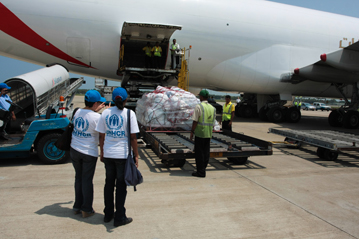Lubbers calls for open borders around Iraq; neighbouring countries prepare for possible refugee influx
Lubbers calls for open borders around Iraq; neighbouring countries prepare for possible refugee influx

GENEVA, March 20 (UNHCR) - With the first shots fired over Baghdad, UN refugee agency chief Ruud Lubbers today urged Iraq's neighbouring countries to keep their borders open to those in need of temporary protection and assistance. This comes as UNHCR intensifies efforts to help Iran and Jordan prepare for a possible refugee influx.
"Despite all of the UN's efforts to find a peaceful solution, we are now faced with the sad reality of war in Iraq and more suffering for the Iraqi people," said Lubbers in a press statement on Thursday. "We must do everything we can to alleviate that suffering, including keeping borders open so that those fearing for their lives can reach safety in neighbouring states."
The High Commissioner also called for unrestricted access to all border areas by UNHCR staff to monitor arrivals and ensure that the rights of refugees are respected.
"UNHCR is doing all it can to assist these neighbouring governments in meeting their primary responsibility to provide refugees with temporary protection and material assistance. We have people and resources in the region and more are arriving every day. But to save lives, we must have open borders and access to all of those seeking temporary asylum," he said.
According to UNHCR's chief of mission in Iran, Philippe Lavanchy, the situation at the Iran-Iraq border crossings was calm on Thursday morning, with no reports of Iraqi refugee movements into Iran following the start of strikes on Iraq.
To help Iran cope with a possible influx, UNHCR announced it is releasing $1 million to prepare four camp sites along the Iranian frontier with Iraq. The sites will each have a capacity for 15,000 refugees to cope with a possible initial influx of 60,000 people.
"Our preparations for a possible influx of refugees has been severely hampered by lack of funding by donors who had been hoping that war in Iraq could be avoided, but now it is upon us, we have to move very quickly," said Lavanchy.
The $1 million UNHCR has released to the Iranian government's Bureau for Aliens and Foreign Immigrant Affairs (BAFIA) is for expenses for the preparatory work - including clearing of land mines, construction of access roads and the building of water and sanitation facilities - in four camp sites along the border inside south-western Iran.
Another six camp sites along the Iranian border have undergone ground levelling and de-mining work.
Meanwhile, to the west of Iraq, UNHCR international staff who arrived in Jordan on Wednesday after leaving Baghdad with the last UN road convoy, said they saw groups of people moving out of Iraq towards the Al Waleed/Al Tanf border crossing with Syria, which was temporarily closed on Wednesday. Smaller groups were seen driving towards the Trebil/Al Karama crossing point with Jordan.
In eastern Jordan's Ruwaished refugee camp, some 60 km west of the Iraqi border, UNHCR is working with the Jordanian Hashemite Charity Organization (JHCO) to prepare the site for up to 5,000 Iraqi refugees within one week. UNHCR plans to make the site ready for up to 10,000 people, and then to enlarge Ruwaished further as necessary.
By Wednesday, up to 70 percent of the Ruwaished site had been levelled, with large rocks removed and the camp perimeter delineated. UNHCR's medical implementing partner at the Ruwaished site, Japan Platform, erected its clinic tent and began to install equipment. Jordan's Ministry of Water and Irrigation installed its desalination machinery at Ruwaished and set up a water tank. UNHCR's partner, Oxfam, began work on the camp's water system.
Due to continuing high winds on Wednesday, workers from JHCO, operating at Ruwaished with the support of CARE, were unable to erect tents at the site. The JHCO staff said they would erect 50 tents on Thursday should any Iraqi refugees start to arrive.
The JHCO warehouse in Ruwaished is rapidly filling up with relief aid, and currently has stocks for more than 10,000 people at the facility.
The UN refugee agency itself has positioned emergency supplies for some 300,000 people in stockpiles in Iskenderun, Turkey; Kermanshah, Iran; and Aqaba, Jordan. Seven emergency response teams - each with about 15 to 20 members - are also ready for deployment within 72 hours. These teams consist of specialists in emergency work, covering a wide range of protection, assistance and technical needs.
In Turkey, UNHCR has sent four mobile teams to monitor the situation on the Turkey-Iraq border.
UNHCR needs $60 million to fund its initial contingency preparations for a planning figure of 600,000 refugees for one month. It will need a total of $154 million to fund its emergency operation over a period of six months.
As of Thursday, the agency had received $21 million, but had spent more than $28 million, including funds borrowed from emergency reserves.
In his statement, High Commissioner Lubbers said, "While we expect neighbouring states to live up to their responsibilities to protect refugees, we also expect the international community to do its part by supporting the humanitarian effort throughout the region.".>









